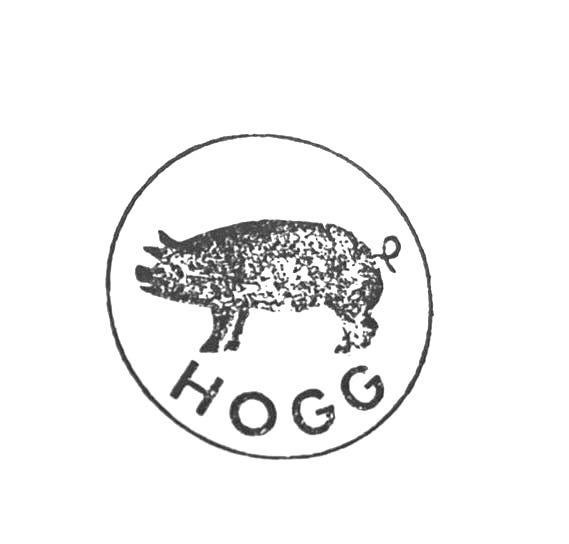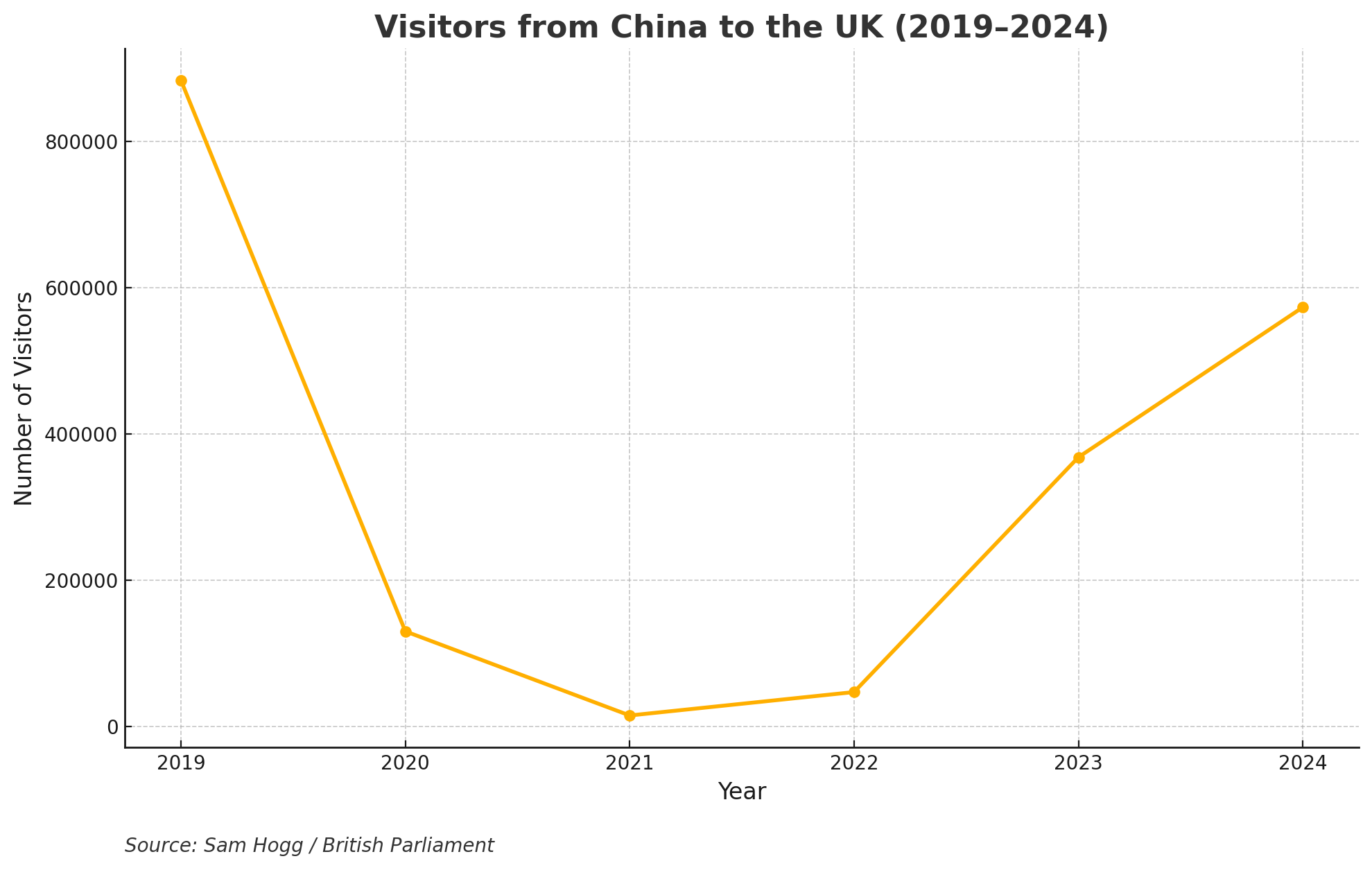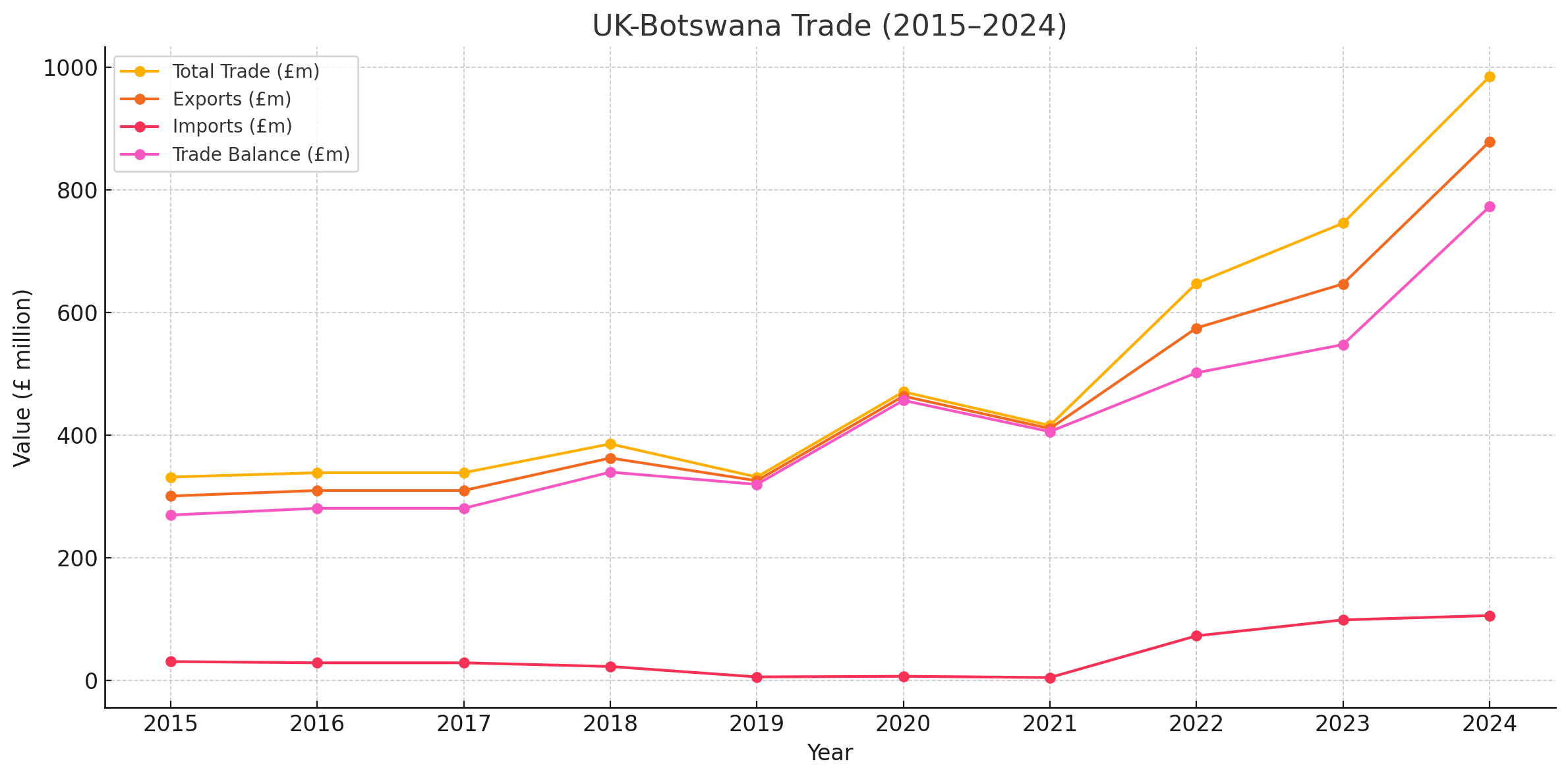Telegram 21
Immigration: Sam Hogg's British Diplomacy Tracker
As a reminder: all opinions expressed in these Telegrams are my own personal opinions, not my employers. This is a project I run in my free time looking at issues under the geopolitical radar.
Hello,
In ‘Thinking Fast and Slow’, the late psychologist Daniel Kahneman discussed an experiment to test logical thinking, using two premises and a conclusion. Try and answer the following:
All roses are flowers.
Some flowers fade quickly.
Therefore some roses fade quickly.
Is this conclusion correct?
The answer is no, yet Mr Kahneman reported “a large majority of college students endorse this syllogism as valid.” This, he continued, “has discouraging implications for reasoning in everyday life [because] it suggests that when people believe a conclusion is true, they are also very likely to believe arguments that appear to support it, even when those arguments are unsound.”
This week’s Telegram focuses primarily on migration, an issue for which many form a conclusion and work back from there. The issue is worth examining as it follows a major speech from the Prime Minister and an accompanying White Paper, and Britain’s migration posture sits upstream of many important decisions Downing Street will make on its foreign, trade, and domestic policy choices. For example, as my Telegram from March noted, the promotion of the UK’s popular former Ambassador to the US, Karen Pierce, to a Special Envoy role in the Western Balkans was aimed squarely at tackling illegal immigration and smuggling gangs. Despite this, Downing Street’s immigration policy and aim is poorly understood and emotion-inducing for many, viewed too often through just a domestic lens.
It’s also important to understand the speech and paper in light of what British Diplomacy Tracker aims to do, and the analysis which follows is neither a rejection nor an endorsement. From its genesis, an effort has been made to draw together the series of competing threads that underpin Labour’s general approach to foreign, industrial and domestic strategy. In the simplest summary, the aim is GROWTH and RE-ELECTION: the latter being tied closely to the former, but both of which impact how the Government projects itself into the world.
On GROWTH, Downing Street has rolled out several new actions, including ploughing through decades-old legislation around planning and energy, seeking pragmatic trade agreements, and reforming the defence procurement pipeline to create new jobs in various constituencies. The aim here is to “put more money in the pockets of working people.” Labour’s self-imposed fiscal headroom has taken a beating, so it remains to be seen how effectively their economic approach pans out over the coming years. Immigration, in Downing Street’s view, has not helped economic growth.
On RE-ELECTION - tied heavily to GROWTH - No10 has a fearful eye on Reform, the right-wing party led by Nigel Farage, currently polling above both Labour and the Conservatives. Some will argue that this week’s speech and White Paper were just an attempt to pull the rug from under Reform: that would be a poor read and fails to account for a deeper movement at play in Westminster and the circles of influential movers in SW1. The linking of high immigration to deflated wages and poor economic performance is an effort to dovetail themes from both the re-election and growth buckets into one coherent narrative.
Elsewhere in today’s note: a slew of new Ambassadors, a visit to London from an African nation’s VP, and an on/off possibility that the Prime Minister will visit Kenya soon.
— Sam Hogg
Keir Starmer, Britain’s Prime Minister, announced major updates to immigration rules. The Prime Minister visited Albania on a trip aimed at tackling the roots of illegal immigration.
David Lammy, the Foreign Secretary, hosted the Weimar+ ministerial meeting in London. The group issued a statement on Ukraine. Mr Lammy then attended the NATO informal Foreign Ministers’ Meeting in Antalya, Turkey.
John Healey, the Defence Secretary, closed trading at the London Stock Exchange as part of a concerted campaign to get more financial support and interest in Defence. Mr Healey then travelled to Germany to announce a new weapons collaboration.
Jonathan Reynolds, the Trade Secretary, met Todd McClay, Minister for Trade and Investment of New Zealand, in London.
General Sir Gwyn Jenkins was appointed First Sea Lord. The announcement came as Mr Jenkins was embroiled in allegations of covering up SAS and SBS murders abroad.
Ndaba Gaolathe, Botswana’s Vice-President, visited the UK. Kenyan media reported Mr Starmer was set to visit the country, but the High Commission denied the claim.
The Chinese Government expressed displeasure at the recent UK-USA economic agreement. “Co-operation between states should not be conducted against or to the detriment of the interests of third parties,” China’s foreign ministry told the Financial Times.
Ministers and representatives of Australia, Brunei, Canada, Chile, Japan, Malaysia, Mexico, New Zealand, Peru, Singapore, the United Kingdom and Vietnam, as parties to the Comprehensive and Progressive Agreement for Trans-Pacific Partnership (CPTPP), met in Jeju, the Republic of Korea, releasing a statement.
Royal College of Defence Studies met with counterparts in Lagos, Nigeria.
The Arctic Council, in which Britain has observer status, held its fourteenth meeting, concluding Norway’s chairship, which passed to Denmark. Stockholm has five overarching priorities for the next two years: indigenous peoples and communities in the Arctic; sustainable economic development and energy transition solutions; oceans; Arctic climate change; and biodiversity.
1. Immigration
KEY POINTS:
Prime Minister Keir Starmer announced his Government would be seeking to signficnaltly reduce the number of immigrants arriving into Britain. The Government published a White Paper alongside a speech in Downing Street
The Prime Minister explicitly argued that high levels of immigration had not increased overall productivty or economic output, but had instead depreciated and depressed wages and employment opportunities
Mr Starmer visited Albania to close out the week, on a trip billed as “clamp[ing] down on criminal networks in [the] Western Balkans”
In every British election since 1992, the winning political party of the day has promised to tighten migration controls. On Monday, Prime Minister Keir Starmer set out his vision.
Spotted
The upcoming National Security Strategy will be the third iteration of the UK’s security priorities in five years. A letter published this week by the Joint Committee on the National Security Strategy “caution[s] against any overly hasty moves to plan for a US drawdown. But we also do not endorse an ostrich strategy"
Mr Starmer sought to paint the preceding Conservative governments’ approach to migration as out of control, with hundreds of thousands of new people arriving in Britain each year, and pledged to dramatically reduce the number of people entering Britain. On the sheer balance of numbers, Mr Starmer is correct.
This is thanks in no small part to the ‘dependent’ offering for health and care visas, which allowed arrivals to bring their “spouse or partner, fiancé, fiancée or proposed civil partner, child, parent, or relative who will provide long-term care.” Per the data, between 2021 and 2023, 55% (315,000) of visas issued to Health and Care workers were to dependents. As of December 2024, there were approximately three dependents for each person coming to do a job in health and social care. For a view from across the aisle, Conservative MP Neil O’Brien has done some data crunching previously, focusing on student visas, which have boomed at lower-tier universities.
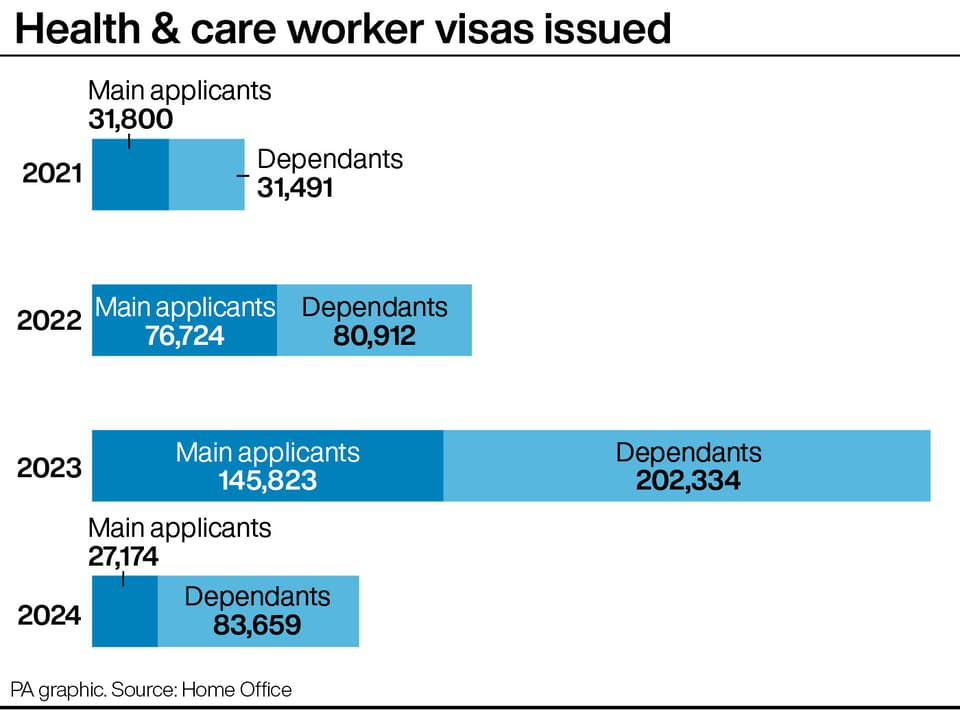
Of the 71,046 health and care worker visas granted in 2023-24:,15,076 (21%) were for Indian nationals; with the next most common countries being Nigeria (13,418 or 19%); Zimbabwe (10,702 or 15%); Ghana (8,826 or 12%); and Bangladesh (7,097 or 10%). From that point of view, the reaction of the media and officials from those countries is worth being aware of:
In Nigeria, the British High Commission was forced to issue a statement: “The UK enjoys strong, long-standing people-to-people links with Nigeria. We are proud that the UK is still considered a top destination for Nigerians to work, study, visit and settle – and value the contribution this brings to the UK.” Nigerians placed highly in the number of Social Care visas handed out over the last five years. Additionally, the UK currently processes roughly 1,500 visa applications daily from Nigeria.
In Kenya, the British High Commission was forced to issue a statement: “Yesterday, the UK Prime Minister launched an immigration white paper, setting out the government’s intention to make changes to our immigration system. These have not yet been implemented. There are no country specific measures and reporting about the termination of a UK-Kenya migration deal are inaccurate – no such deal exists.”
In Ghana, the media covered the news, warning that it would impact their citizens. Some called it “draconian.”
In India, the media interviewed experts, who tended to focus on the graduate scheme options. Some ran quotes from the Indian diaspora in the UK, while others focused on the knock-on impact for young Indians.
Quoted
“In 2023, under the previous government, inward migration exploded to over a million people a year – four times the level compared with 2019. This was a political choice that was never put before the British people. In fact, quite the opposite – the previous government repeatedly promised inward migration would be brought under control. Instead, Britain became a one-nation experiment in open borders. The damage this has done to our country is incalculable”
Prime Minister Keir Starmer
Yet despite this immigration wave, per the Government’s White Paper, “evidence suggests inflows of lower-skilled migrants are more likely to distort the labour market – which is precisely why the balance and mix of migration is so crucial. Whilst there are currently record levels of migrant workers filling shortages in the UK labour market, the figure below shows that 6 out of the 10 sectors seeing this highest change in payrolled employments of non-EU nationals have been correlated with declines in UK employment over the period.”
In the foreword to the paper, Mr Starmer stated that immigration since 2019 has led to “Public services and housing…placed under too much pressure. Our economy has been distorted by perverse incentives to import workers rather than invest in our own skills. In sectors like engineering, for example, apprenticeships have almost halved while visas doubled.” His words caused some anger in Westminster, although polling from YouGov found the majority of Brits agreed with his rhetoric.
Spotted
The British Government is updating whistleblowing laws to make it easier and safer for people to report breaches of sanctions.
This issue will likely continue to simmer as a diplomatic knot that Ambassadors and High Commissioners will have to contend with on their brief for years to come. One area that attention may turn to next is a breakdown of which nationalities are currently claiming benefits or social housing in the UK - a point raised (and tweeted, racking up over 1.4 million views so far) by influential Conservative MP Nick Timothy in Parliament.
To take the migration conversation international, Mr Starmer visited Albania at the end of the week. Gangs and criminals from the country play a critical role in facilitating illegal smuggling and related crimes, and the Prime Minister used his trip to announce the expansion of the Joint Migration Task Force with Albania and Kosovo to include North Macedonia. Downing Street is hoping its upcoming Western Balkans Summit, in the Autumn, will be instrumental in cementing wider international attention on this issue.
Quoted
“Every step we take to tackle illegal migration overseas, cripple the criminal networks that facilitate it and stem the finance streams that fund it is delivering safer streets in the UK, and reducing the strain on taxpayer funded services.”
Keir Starmer, Prime Minister, on his trip to Albania
As part of an enhanced strategic partnership with Albania, the Prime Minister and Albania’s Prime Minister Edi Rama also announced:
Both nations will deepen cooperation to combat people smuggling, support trafficking victims, and prevent repeat illegal migration by deported Albanians.
A new joint initiative will target illicit finance and underground money laundering between the UK and Albania.
The UK will donate two forgery detection machines to Albania’s State Police to help detect fake or stolen passports.
A reintegration programme will be launched in northern Albania to help returned migrants find work and reduce repeat migration.
Both countries will increase efforts to tackle serious organised crime, including a new DNA-sharing programme to track criminals. This forensic cooperation has already led to over 1,000 database matches and 55 arrests of serious criminals in the UK.
The UK will invest an additional £1 million to improve Albania’s forensic, biometric and digital crime-fighting capabilities.
The Prime Minister finished the week at a conference in Albania, where he warned Russia that a new slew of sanctions would arrive on energy assets if Moscow refused to engage in peace talks sincerely. Mr Starmer was set to host a security roundtable with the Prime Minister of Sweden, Ulf Kristersson, as well as key partners including France, Germany, Italy, Poland and Ukraine.
Spotted
Russia’s defence and security spending is now 40% of all federal spending and 8% GDP – a post-1990 high and double the size of federal social services spending.
CHART OF THE WEEK
Chinese tourism numbers have yet to return to their pre-pandemic heights. By 2050, 1 in 3 Chinese citizens and 1 in 4 Brits will be over 65 years old.
2. African diplomacy
Ndaba Gaolathe, Botswana’s Vice-President, visited the UK. He met with Lord Collins, the UK’s Africa Minister.
British Diplomacy Tracker scooped that Prime Minister Keir Starmer is set to visit Kenya. His trip would follow recent visits from Defence Secretary John Healey and other high level officials. The British High Commission in Nairobi denied a visit is on the cards
Botswana, the landlocked African nation of around two and a half million people, is going through a rough patch. Its economy contracted by 3.0% in 2024, primarily due to a sharp decline in global demand for rough diamonds, which constitute over 70% of the country's exports and about a quarter of its GDP. The government is eyeing cuts to public services, and the budget deficit looks set to widen.
Spotted
Botswana is often held up as an example of a well functioning democracy in Africa, and is noted for its close ties to the US, UK and other international partners. The UK’s Trade Minister, Alexander Douglas, was in the country earlier this year.
This is the grim macro environment that set the scene for Vice President Ndaba Gaolethe’s visit to London. A meeting with Lord Collins, the Minister for Africa, yielded few public details - “a keen focus on trade, investment and renewable energy” tweeted the peer - a theme that continued throughout the visit. The UK’s trade with Botswana is limited but growing in the low millions a year, primarily fuelled by British exports to the country.
Quoted
“We envision a country that becomes the logistics capital of Southern Africa, a future where the cities of Johannesburg, Harare, Lusaka, Windhoek, and Gaborone are stitched together by seamless corridors of rail, road, and data.”
Vice President Ndaba Gaolethe on Botswana’s future
Moving north, British Diplomacy Tracker was the first outlet in Westminster to pick up claims by Kenyan media that Prime Minister Keir Starmer would be visiting the nation imminently. Reports stated Dr. Raymond Omollo, Kenya’s Principal Secretary for Internal Security and National Administration, confirmed the visit following a meeting with British High Commissioner Neil Wigan in Nairobi - soon denied by Downing Street.
Per the media reporting, immigration is set to be a potential area of focus if the trip does go ahead, alongside strengthening cybersecurity cooperation and advancing police reforms. As noted in previous Telegrams, Kenya is currently running an inquiry into allegations of illegality by British troops stationed in the country; Defence Secretary John Healey recently visited to make amends for one particularly horrible crime.
Noted
The Government has recently intervened three times under the National Security and Investment Act regarding foreign-led efforts to take over critical companies. All have been allowed to go through, with conditions.
DEFENCE
John Healey, the Defence Secretary, became the first person in his position to close trading at the London Stock Exchange.
Britain and Germany confirmed for the first time that they will work together to develop a new long-range strike capability with a range of over 2,000 km.
Andrew Burns CB OBE, Vice Admiral and Fleet Commander of the Royal Navy, attended the launch of defence firm Helsing’s maritime partnership with several other companies.
Sheikh Saud bin Saqr Al Qasimi, Supreme Council Member and Ruler of Ras Al Khaimah, received a high-level delegation from the UK’s Royal College of Defence Studies, led by Philip Parham, Director at the College and former UK Ambassador to the UAE.
INTELLIGENCE
Barbara Woodward, the former Ambassador to China, is being considered to run MI6.
FOREIGN AFFAIRS
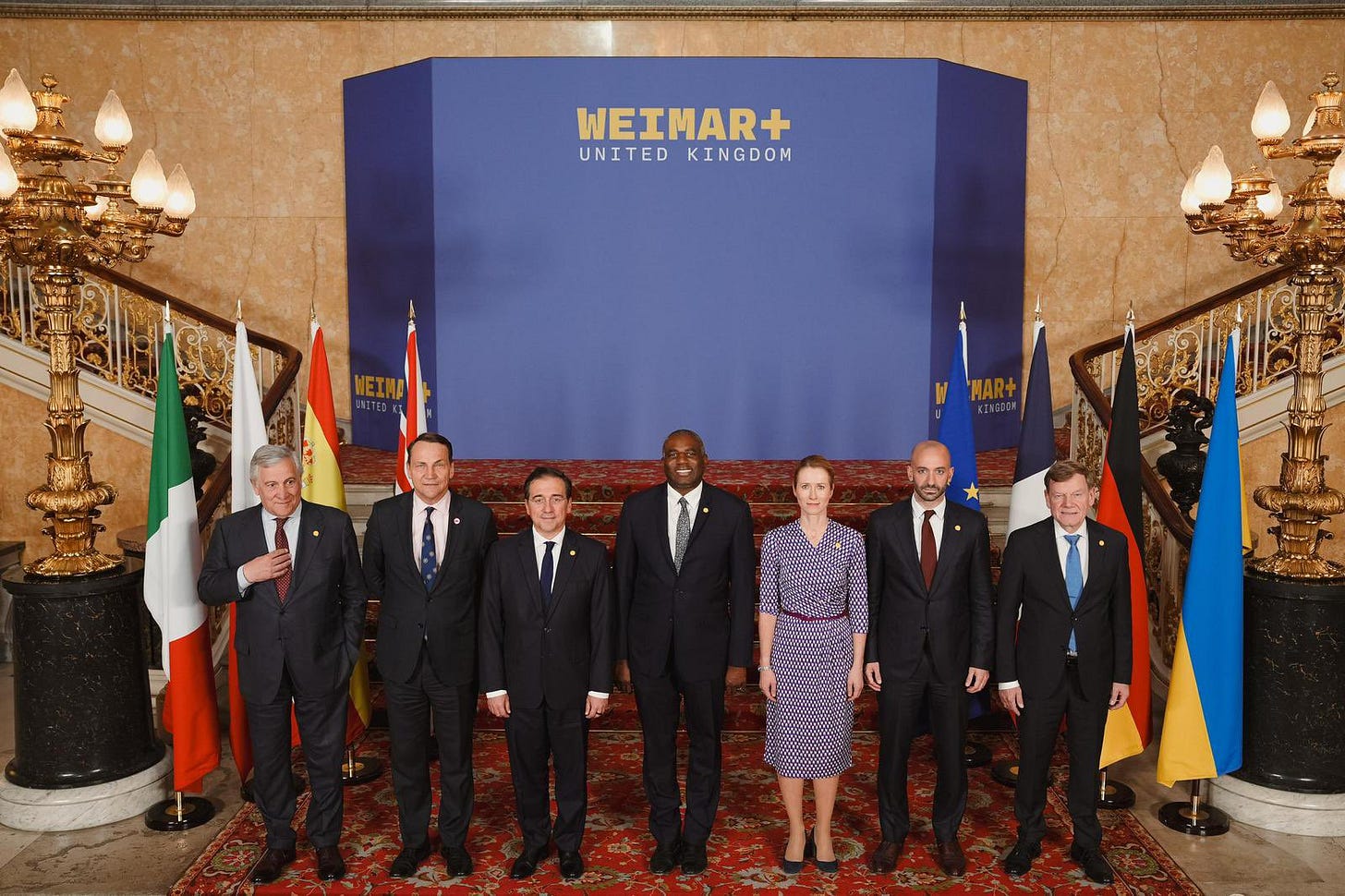
Keir Starmer, the Prime Minister, welcomed the Prime Minister of Sweden Ulf Kristersson, spoke to the Taoiseach Micheál Martin, and Canada’s Prime Minister Mark Carney.
David Lammy, Foreign Secretary, met with Kaja Kallis, EU High Representative for Foreign Affairs and Security Policy.
Hamish Falconer, Minister for the Middle East and North Africa, spoke to his Saudi counterpart.
Tsai Ing-wen, Taiwan’s former President, visited the British Parliament.
SANCTIONS
The Government released a cross-department review of sanctions implementation and enforcement.
Throughout 2024, the majority of export control refusals continued to be for licences to China. The majority were related to the new military end-use controls and the addition of China to the list of destinations subject to the military end-use control.
AI & EMERGING TECH
The UAE and Saudi Arabia signed massive AI deals with the US and its leading AI firms.
Peter Mandelson, Ambassador to the UK, met with Illinois’ governor to discuss quantum, among other technology opportunities.
The UK Quantum Skills Taskforce published its report.
Collin Crooks, Ambassador in South Korea, wrote for local media that "both the US and India recognised the UK as a trustworthy negotiating partner with a strong economic foundation and a world-leading innovation economy- especially in emerging fields like [AI]."
The Government announced a use-case for Humphrey, its AI system aimed at helping civil servants get through huge amounts of literature.
Brian Jones, High Commissioner to Fiji, was involved in a day-long event training Fijian journalists about the use of AI in their content and industry.
DOMESTIC AND DIASPORA
Julius Malema, the firey leader of South Africa’s opposition Economic Freedom Fighters (EFF) party, was denied entry to the UK. “I was supposed to get there in London to meet with students, as I was invited by Cambridge University, but the white people denied me entry to London, saying they wouldn’t give me a visa…They denied me a visa because I can’t be bought. I can’t be bought by imperialism and colonialism. I don’t beat around the bush; I speak the truth, whether you like it or not,” he said at a gathering.
British police charged Kyaw Zwar Minn, Myanmar's former ambassador to the United Kingdom, with trespassing on a diplomatic residence in London that he has refused to leave since being ousted for opposing Myanmar's 2021 military coup.
At a Parliamentary event (attended by Jeremy Corbyn MP among others), Sudan’s Ambassador Babikir Elamin accused the UAE of fuelling the war in his country by proxy.
Some Nigerians staged a protest at the Nigerian High Commission and the Home Office on Monday, demanding the deportation of former NNPCL boss Mele Kyari to face a corruption investigation.
TRADE & BUSINESS
South Korea and Britain’s Free Trade Agreement negotiations are nearing an end, per an article in Korean media.
India’s Gurgaon-based ReNew Energy Global Plc has secured Rs 8.7 billion from British International Investment (BII), marking BII’s first investment in India’s solar manufacturing sector.
DIPLOMATS
Peter Wilson CMG has been appointed His Majesty’s Ambassador to China. His father, David Wilson, was the penultimate Commander-in-Chief and 27th Governor of Hong Kong.
Dame Melinda Simmons DCMG has been appointed His Majesty’s Ambassador to the Republic of Poland.
Colin Martin-Reynolds CMG has been appointed Governor of the Falkland Islands and His Majesty’s Commissioner for South Georgia and the South Sandwich Islands.
Kanbar Hossein-Bor has been appointed British High Commissioner to the Republic of Fiji. He makes history as the first refugee to be appointed to a High Commissioner role.
Qudsi Rasheed OBE has been appointed His Majesty’s Ambassador to the State of Kuwait.



